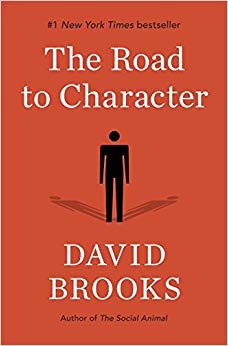The Road to Character

We’ve all met a particular kind of person:
They radiate a sort of moral joy. They answer softly when challenged harshly. They are silent when unfairly abused. They are dignified when others try to humiliate them, restrained when others try to provoke them. But they get things done. They perform acts of sacrificial service with the same modest everyday spirit they would display if they were just getting the groceries. They are not thinking about what impressive work they are doing. They are not thinking about themselves at all. They just seem delighted by the flawed people around them. They just recognize what needs doing and they do it.

How do we become such a person? David Brooks, New York Times columnist, wrote The Road to Character to try to answer this question. He’s driven, in part, by a shift that he’s noticed in society. We now believe the gospel of self-trust: “Follow your passion. Don’t accept limits. Chart your own course. You have a responsibility to do great things because you are so great.” We’ve bought into a set of assumptions that would have been foreign just a few decades ago.
So Brooks examines the lives of notable thinkers and leaders in history: Augustine, Dwight Eisenhower, George Eliot, and more. They’re all different, and they’re all flawed, but they all followed a pattern:
…each person was redeemed by that weakness. Each person struggled against that weakness and used that problem to grow a beautiful strength. Each person traveled down into the valley of humility in order to ascend to the heights of tranquillity and self-respect.
Enjoyable Stores
Brooks is a skilled writer. If you have never read him before, you’ll enjoy getting to know him through this book. He effortlessly weaves between his reflections and the stories of significant people throughout history.
I was taken by many of his character sketches. I’d talk to Charlene about what I’d learned: about George Marshall’s desire to command Operation Overlord (the invasion of France) near the end of World War II, for instance, but his refusal to express those desires to the President when asked. “Marshall insisted that his own private feelings should have no bearing on the decision. Again and again, he refused to express his preference one way or the other… It was the greatest professional disappointment of Marshall’s life, and it came about because he refused to express his own desires. But that, of course, was the code he lived by.”
I was surprised by some of the stories that Brooks chose. I struggled through George Eliot’s story, for instance. But Brooks does a good job of demonstrating the growth in character in the lives of people throughout history, and mining those stories for lessons today.
It’s not every bestselling book that explains Augustinian theology and the implications for today, or that uses pastor and author Tim Keller to explain that “in Christian thought, the trial is already over. The verdict came in before you even began your presentation. That’s because Jesus stood trial for you. He took the condemnation that you deserve.” But this book does.
The Humility Code
Brooks concludes with a Humility Code, “a coherent image of what to live for and how to live.” It contains 15 propositions, and I want to cheer most of them. “We don’t live for happiness, we live for holiness,” begins the first proposition. “Although we are flawed creatures, we are also splendidly endowed,” says another. “We are all ultimately saved by grace.”
Brooks has not written a Christian book, but it stops just short of being one, at least in its conclusions. It’s a remarkable book in terms of challenging many of our current cultural beliefs, and replacing them with more biblical ones.
I enjoyed this book and was surprised by it. I found the character sketches interesting, and I was encouraged by his conclusions. I’d recommend this book as an insightful look at why many of our culture’s beliefs are wrong and dangerous, and how more accurate beliefs lead to the good life we all desire. It succeeds in putting us on the road to character.
More from Amazon.com






